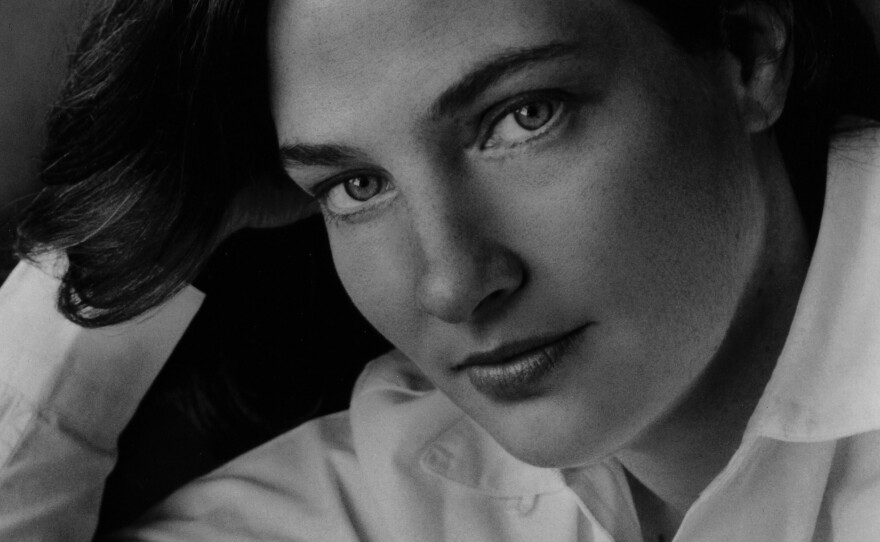A.M. Homes is a writer I'll pretty much follow anywhere because she's indeed so smart, it's scary; yet she's not without heart. It's been a while since her last book, the 2007 memoir The Mistress's Daughter, which is certainly the sharpest and most emotionally complex account of growing up adopted that I've ever read. Her latest book is a novel, May We Be Forgiven, and it returns her to blighted fictional terrain she's wandered through before: that is, the nightmare-scape of contemporary suburbia as seen through the eyes of a middle-aged man who's been stripped — Lear-like — of family, job and belief.
Ordinarily, a plot synopsis like that would make me roll my eyes, but I don't — because this is A.M. Homes and I know I've got to watch her every move. Homes' suburbia is a place where yawning sinkholes will suddenly open up in front lawns, swallowing cliched plotlines and opening portals to other dimensions. After the first page or so of a Homes story, your next stop is always the Twilight Zone.
Consider the way this novel blasts off. Chapter 1 introduces us to our hero, 48-year-old Harry Silver, who's writhing through yet another Thanksgiving dinner at the crowded table of his rich and powerful younger brother, George. Here's the deadpan style in which Harry, looking around the room, assesses his niece and nephew:
Nathaniel, twelve, and Ashley, eleven, sat like lumps at the table, hunched ... as if poured into their chairs, truly spineless, eyes focused on their small screens, the only thing in motion their thumbs — one texting friends no one has ever seen and the other killing digitized terrorists. They were absent children, absent of personality, absent of presence, and, except for holidays, largely absent from the house. They had been sent away to boarding schools ... there were allusions to nonspecific learning issues, failure to bloom.
Within the next 15 pages, however, the rug is completely pulled out from under this mundane Thanksgiving table, and the atmosphere within the extended family becomes more Norman Bates than failed Norman Rockwell. Brother George, who's always had anger management issues, goes haywire and murders his wife who, by the way, was in bed with Harry at the time. Harry, then, becomes the legal guardian of those two listless children while, at the same time, coping with the fact that his own wife is now divorcing him. This screwball tragedy gathers further force when Harry — a part-time professor of history specializing in the field of "Richard Nixon Studies" — is fired by his university. The history department chair explains to Harry that:

[T]imes are changing ... We've [hired] this fellow who has a new way of teaching history, it's future forward ... Instead of studying the past, the students will be exploring the future — a world of possibility. We think it will be less depressing than watching reruns of the Zapruder films.
By making Harry's field of specialization "Nixon Studies," Homes is directly nodding to one of her literary mentors, Don DeLillo, whose classic novel White Noise featured a professor of "Hitler Studies." DeLillo actually has a walk-on in this novel, as do Julie Nixon Eisenhower and David Remnick, the real-life editor of The New Yorker.
By now, I can no longer avoid using the dread adjective "postmodern" in describing May We Be Forgiven. Obviously, Homes writes in a style that violates the boundaries between fact and fiction, satire and earnest despair. Beneath all the po-mo trimmings, however, she serves up an entertaining, old-fashioned American story about second chances. No wonder Richard Nixon is the presiding icon here; if Nixon can be rehabilitated, anyone can!
Indeed, by the end of this sweeping (if, sometimes, too digressive) novel, Harry fights his way out of alienation and assembles a vibrant alternative family around that holiday table. May We Be Forgiven may feature Homes' distinctively off-beat humor and jagged storylines, but she's a softie at heart. Her writing is strange, to be sure, but it's also deeply imbued with that kind of It's A Wonderful Life-type belief in redemption that we Americans will always be suckers for, and rightly so.
Copyright 2023 Fresh Air. To see more, visit Fresh Air. 9(MDAzMjM2NDYzMDEyMzc1Njk5NjAxNzY3OQ001))






